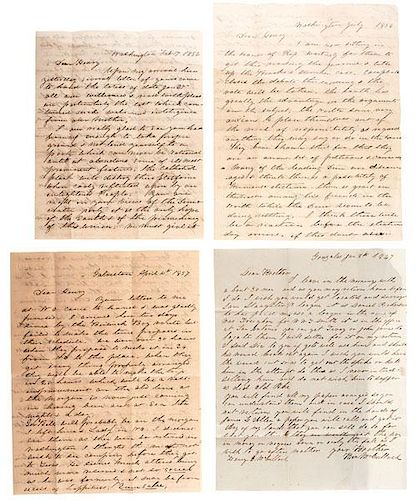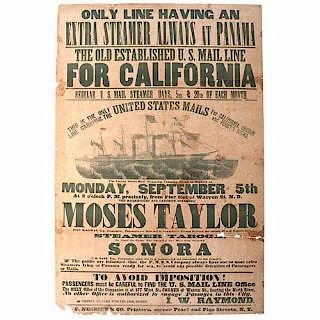Texas Ranger and Militia Officer, Mexican War Major, and Confederate Brigadier General Benjamin McCulloch, Letters Incl. Discussion of the Charles Sum
About Seller
6270 Este Ave.
Cincinnati , OH 45232
United States
With offices in Cincinnati, Cleveland and Denver, Cowan’s holds over 40 auctions each year, with annual sales exceeding $16M. We reach buyers around the globe, and take pride in our reputation for integrity, customer service and great results. A full-service house, Cowan’s Auctions specializes in Am...Read more
Two ways to bid:
- Leave a max absentee bid and the platform will bid on your behalf up to your maximum bid during the live auction.
- Bid live during the auction and your bids will be submitted real-time to the auctioneer.
Bid Increments
| Price | Bid Increment |
|---|---|
| $0 | $25 |
| $500 | $50 |
| $1,000 | $100 |
| $2,000 | $250 |
| $5,000 | $500 |
| $10,000 | $1,000 |
| $20,000 | $2,500 |
| $50,000 | $5,000 |
| $100,000 | $10,000 |
About Auction
Jun 10, 2016 - Jun 11, 2016
Cowan's Auctions dawnie@cowans.com
- Lot Description
Texas Ranger and Militia Officer, Mexican War Major, and Confederate Brigadier General Benjamin McCulloch, Letters Incl. Discussion of the Charles Sumner - Preston Brooks Incident
Lot of 4 letters from Benjamin McCulloch to his brother Henry McCulloch written during the Mexican War in 1847 and during his time in Washington in 1856.
Born in Tennessee of impressive parentage, one could assume Benjamin (Ben McCulloch lived a privileged early life. His mother was the daughter of a prominent Virginia planter. His father was a Yale alumni who served a major on Brig. Gen. John Coffee's staff during Andrew Jackson's campaign against the Creeks in Alabama. However, the family lost much of their wealth after the Revolutionary War and Benjamin's father squandered what was left of his inheritance, leaving no money for he and his brothers' educations. Instead of his father, influential family friends and neighbors Sam Houston and David Crockett provided opportunities for Ben McCulloch to succeed.
The McCullochs moved often between 1812 and 1830, but finally settled in Dyersburg, TN where Ben and his younger brother Henry hunted, rafted, farmed, and developed a close friendship with David Crockett. Ben followed Crockett to Texas on log rafts down the Mississippi. He joined Houston's army on its retreat into East Texas and became a 1st Lieut after successfully commanding one of the Twin Sisters at the battle of San Jacinto. Following a brief rest from his military career as a surveyor, he joined the Texas Rangers under John Coffee Hays and earned a reputation as a fierce Indian fighter. During the Mexican Wars, he raised a command of Col. Jack Hays's First Regiment of the Texas Mounted Vol. and became chief of scouts under Zachary Taylor. During his intermittent career in the Mexican War McCulloch wrote to his brother, Henry,
I leave in the morning with about 30 men and as you may return home before I do I wish you would get located and surveyed....Any of my lands you can sell do so for what you think they are worth get the pay in money or negroes down or early this fall as I wish to go after mother (Gonzales, January 8, 1847).
McCulloch was a fierce supporter of slavery and felt that the dissemination of the institution was an affront to Southern honor and would destroy the South's political liberties. He took his passions to Washington and served under Judge John Charles Watrous during Franklin Pierce and James Buchanan's administrations. In May of the 1856 Presidential election, debates in Congress reached a boiling point when Senator Preston Brooks beat Senator Charles Sumner with a cane after Sumner's bitter speech, "The Crime Against Kansas." Republicans clamored that the House oust Brooks for the beating. Two months later, McCulloch waited with his friends in the House of Representatives to hear the House's decision. The South has greatly the advantage in the arguments on the subject, the North seem very anxious to place themselves out of the reach of responsibility as regards to anything they may say or do in the House they have shown thus far that they are an arrant set of patroons and cowards, wrote McCulloch (Washington, July 1856). The House decided to fine Brooks 300 dollars for his actions. Brooks resigned, only to be re-elected by his state and return to his position.
As a stalwart supporter of the South and slavery, McCulloch saw the upcoming presidential election as an important indicator for the future of the country. He wrote to his brother that he would raise an army and march on Washington before letting a Black Republican be inaugurated on southern soil. If the south are so blind to their own interest and honor as to submit [to Fremont], then I am for the secession of Texas, wrote McCulloch. We came into the Union without own free will and can go out if we think proper to do so (Washington, July 1856
Texas seceded and McCulloch raised an army, but not as a result of the 1856 election. Buchanan defeated Fremont, postponing the upcoming war. A few months after Buchanan's election, McCulloch wrote to his brother Henry, You are right in your views of the democratic party is it the only hope of the South and of the permanence of this union, We must give its nominee for the President all our support, then there will be no doubt of of his soundness on Southern rights (Washington, February 17, 1856). Although the election of Buchanan pleased McCulloch, Buchanan's presidency pleased no one. Many labeled him as a "doughface", a Northerner with Southern sympathies and his attempts at keeping the peace alienated both parties.
After the secession of Texas, McCulloch was commissioned as a colonel and led the bloodless surrender of General Twiggs with the federal arsenal at the Alamo on February 16, 1861. Jefferson Davis appointed him brigadier general on May 11, 1861. While fighting at the battle of Pea Ridge in 1862, a union soldier shot him from his horse, killing him instantly. His body on the battlefield was moved to the cemetery at Little Rock and again to the State Cemetery in Austin. Many historians believe his death resulted in the disastrous loss of Arkansas to the Union forces.Very good, typical folds and toning of the paper.Condition
- Shipping Info
-
SHIPPING. At the request of the buyer, Cowan's will authorize the shipment of purchased items. Shipments usually occur within two weeks after payment has been received. Shipment is generally made via UPS Ground service. Unless buyer gives special instructions, the shipping method shall be at the sole discretion of Cowan's Auctions, Inc.. Cowan's is in no way responsible for the acts or omissions of independent handlers, packers or shippers of purchased items or for any loss, damage or delay from the packing or shipping of any property.
-
- Buyer's Premium



 EUR
EUR CAD
CAD AUD
AUD GBP
GBP MXN
MXN HKD
HKD CNY
CNY MYR
MYR SEK
SEK SGD
SGD CHF
CHF THB
THB











